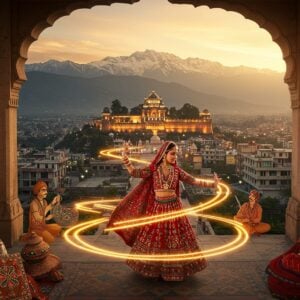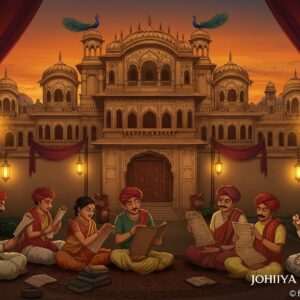
Purandara Dasa, revered as the “Pitamaha” (father or grandfather) of Carnatic music, holds a significant place in Indian classical music. His life story is a compelling narrative of transformation, from affluent merchant to venerated saint and composer. Exploring his journey allows us to appreciate his profound musical and spiritual contributions.
Birth and Early Life
Purandara Dasa was born in 1494 in Kshemapura, present-day Karnataka, India, during the culturally rich era of the Vijayanagara Empire. Born Srinivasa Nayaka, his family enjoyed a privileged status as prosperous gold merchants. His parents, Varadappa Nayaka and Leelavathi, instilled in him not only business acumen but also a deep sense of devotion. This upbringing provided a strong foundation in Sanskrit and music, essential elements that shaped his future endeavors. This early exposure to both commerce and the arts would play a crucial role in his development.
Education, Marriage, and Transformation
Srinivasa Nayaka’s education encompassed Kannada, Sanskrit, and music, demonstrating his aptitude for both intellectual and artistic pursuits. At 16, he married Saraswati Bai. While he excelled in his father’s gemstone and pawning business, amassing considerable wealth and earning the moniker “Navakoti Narayana,” a pivotal encounter with a sage sparked a profound spiritual awakening. This led him to renounce his material possessions and embrace a life dedicated to Lord Hari (Krishna) as a Haridasa. This transformation, initially met with resistance, marked a turning point in his life. Guided by Saint Vyasaraja, who bestowed upon him the name Purandara Vittala, he embarked on a path of devotion and musical expression. This change was a testament to his evolving spiritual understanding.
Musical Contributions and Legacy
Purandara Dasa’s contributions to Carnatic music are immeasurable. He systematized its teaching, introducing graded exercises like Svaravalis and Alankaras, and established Mayamalavagowla as the fundamental raga for beginners. This structured approach democratized access to musical education, leaving an enduring legacy. He composed an estimated 475,000 songs in Kannada and Sanskrit, of which around 1,000 survive today. Known as Dasara Padagalu, these compositions are rich in devotional fervor, often extolling Lord Krishna while subtly critiquing societal ills. His musical innovations greatly influenced subsequent composers, notably Thyagaraja, who regarded Purandara Dasa as his “manasika guru” (spiritual mentor). You can find various items related to Krishna worship on Poojn.in, such as brass Laddu Gopal idols.
Cultural and Historical Context
Purandara Dasa’s life unfolded against the backdrop of the Vijayanagara Empire, a period marked by flourishing arts and religious fervor. This environment fostered his creativity and allowed his work to thrive. The Bhakti movement, with its emphasis on personal devotion, deeply influenced his compositions, many of which focus on Lord Vishnu. These songs not only express his spiritual devotion but also offer insights into the social and moral landscape of his time. The empire’s patronage of art and literature created an atmosphere conducive to his musical and spiritual pursuits.
Poojn.in: Supporting Your Spiritual Journey
At Poojn.in, we offer a wide selection of authentic puja items to support your spiritual practice. Explore our range of Krishna puja items, including brass idols, puja thalis, diyas, incense, and more. Enhance your devotion with high-quality products delivered right to your doorstep.
Conclusion
Purandara Dasa’s journey embodies the transformative power of faith and music. His evolution from a prosperous merchant to a revered saint and composer continues to resonate with those seeking spiritual growth and artistic expression. His impact on Carnatic music and the Bhakti movement remains profound, shaping devotional practices even today. Learn more about the symbolism of Krishna’s flute and its significance in devotion. His life serves as a timeless reminder of the enduring connection between music, devotion, and the divine.


